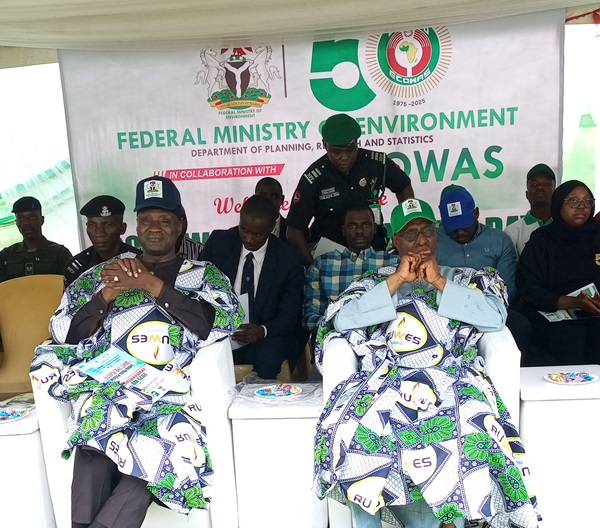
The Federal Government has reiterated its unwavering commitment to creating a cleaner, greener, and more resilient Nigeria by tackling plastic pollution through comprehensive policies and community-led action.
The Minister of Environment, Balaraba Lawal, made this known in Abuja during the 2025 World Environment Day (WED) commemoration themed “Ending Plastic Pollution.”
Lawal described plastic pollution as more than an environmental problem, calling it an economic and public health crisis threatening livelihoods and natural ecosystems. He lamented that every minute, vast amounts of plastic waste are dumped into oceans, rivers, and drainage channels, endangering wildlife and worsening flooding in many cities.
He linked frequent urban flooding directly to blocked waterways caused by careless waste disposal and poor urban planning, noting that responsible design and waste management can significantly mitigate these impacts.
According to him, Nigeria faces daunting challenges in managing plastic waste sustainably. He pointed out that cities and rural communities alike grapple with widespread littering, ranging from ubiquitous sachet water bags cluttering streets to harmful microplastics infiltrating the food chain and posing serious health risks.
Lawal assured citizens that the government is not standing idle but has instead developed and is implementing a National Policy on Plastic Waste Management, which outlines a strategic approach to reduce plastic use, promote recycling, and drive innovation towards sustainable alternatives.
Highlighting the importance of the “Three Rs” – reduce, reuse and recycle – Lawal urged all Nigerians to adopt more responsible consumption habits. He explained that citizens should prioritise reducing plastic use wherever possible, reuse items when practical and recycle waste to help curb the escalating plastic crisis. He added that embracing this mindset is crucial to protecting the environment for future generations.
To strengthen accountability, the minister announced that the Extended Producer Responsibility (EPR) Programme has been launched and mandates manufacturers to take full responsibility for the entire lifecycle of their plastic products, from production to disposal. He said the Ministry is working closely with stakeholders across government, industry, and civil society to ensure that these policies deliver real change but stressed that no single entity can achieve success alone.
He called on all citizens to become active participants, urging communities to mobilise youths to collect discarded plastics and sachet water bags from the streets. This approach, he noted, simultaneously addresses waste management and provides job opportunities for young people, contributing to poverty alleviation.
Lawal called on individuals and organisations to make conscious choices and become ambassadors for environmental stewardship, emphasising that safeguarding Nigeria’s ecosystems and ensuring a cleaner, healthier environment must be a collective mission.
The ministry’s permanent secretary, Mahmud Kambari echoed these sentiments, warning that plastic pollution poses a significant threat to ecosystems, public health and economic wellbeing, with Nigeria experiencing the brunt of these impacts through clogged drains, contaminated food systems, and damaged marine life. He urged all stakeholders to intensify policy enforcement, raise public awareness, promote responsible consumption, and invest in alternatives that can replace harmful single-use plastics.
In his goodwill message, ECOWAS commissioner for economic affairs and agriculture, H.E. Massandje Toure-Litse highlighted the regional dimension of the crisis. He cautioned the public against heating lightweight plastics in microwaves, explaining that this releases hydrocarbons that can cause cancer. He said West Africa generates about eight million metric tonnes of plastic waste annually, with more than 80 percent poorly managed, severely harming human health, fisheries, tourism and coastal economies.
Toure-Litse noted that ECOWAS has adopted a plastics management regulation requiring member states to harmonise their laws and implement best practices. He praised countries like Ghana, Nigeria, Senegal and Côte d’Ivoire for taking proactive measures such as banning plastic bags and enforcing extended producer responsibility frameworks.
He underscored that tackling plastic pollution is integral to achieving the ECOWAS Vision 2050, which places environmental sustainability at the heart of inclusive development.
UNICEF Nigeria’s chief of WASH, Dr. Jane Bevan stressed the disproportionate impact of plastic pollution and climate change on children and young people in vulnerable communities. She noted that these groups face severe consequences for their health, education and future well-being if decisive action is not taken.
She spotlighted UNICEF’s Green Rising initiative, which aims to empower 20 million children and youths globally, with over 100,000 “green actions” already recorded in Nigeria alone. Bevan called for collective action, youth empowerment, and the adoption of sustainable practices to secure a healthier Nigeria.
Echoing this call for action, the senior vice-president of corporate services at Oando Clean Energy Limited (OCEL), Alero Balogun described plastic pollution as a pressing daily reality in Nigeria. She revealed that OCEL’s flagship project in Ogun State processes 2,750 metric tonnes of PET plastic every month, turning waste into valuable raw materials and creating green jobs for local communities.
She highlighted OCEL’s investments in clean energy solutions, such as developing electric buses for Lagos, and praised the Rural Women Energy Security initiative for empowering women to lead in environmental innovation.
ZoomLion Nigeria’s managing director, Habiba Abubakar reinforced the need for a people-driven, inclusive approach to combat plastic pollution. She detailed the company’s commitment to empowering women as leaders in environmental transformation through recycling jobs, waste recovery and technical training. Abubakar urged stronger partnerships and supportive policies to convert Nigeria’s plastic waste challenge into a catalyst for economic growth and community resilience.
Together, government, industry, civil society and citizens are being called to unite efforts to build a cleaner, greener Nigeria where plastic pollution is replaced with sustainable solutions and empowered communities.

